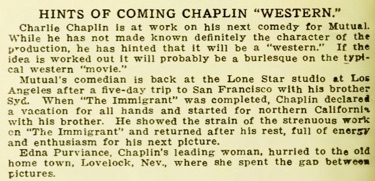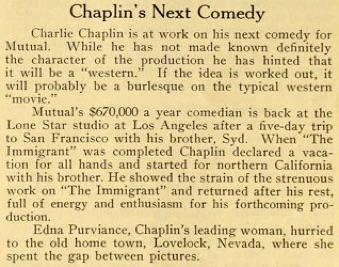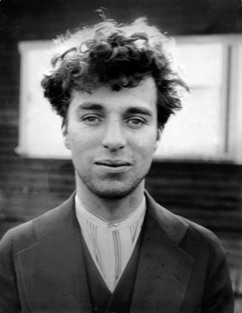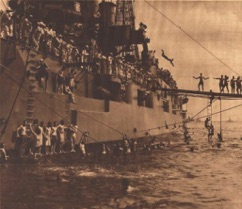The Adventurer Clippings 1/84
Moving Picture World, New York, July 14, 1917.
Charles Chaplin, 1916
& Clean Men for Clean Shots
The high tension of target practice and the routine of daily
drill must be relieved by moments like the one pictured
here. That Jack at play has his opportunity for relaxation and
athletics is as important to the efficiency as are the hours
of drill and study.
(...) Photo by E. Muller, Jr., N. Y., New York Tribune,
Sept. 2, 1917
& Chaplin may not have to go to war on account of his height.
(...) Some Little Stuff By Me,
Screamer/Motion Picture Times, Los Angeles, July 21, 1917.
Clark Irvine is editor and publisher of the Screamer.
& Chaplin‘s Next Comedy
(...) Motography, July 14, 1917.
Almost identical with Moving Picture World, July 14, 1917.
„Returned after his rest, full of energy“
Editorial content. „Hints of Coming Chaplin ,Western.‘
Charlie Chaplin is at work on his next comedy for
Mutual. While he has not made known definitely the character
of the production, he has hinted that it will be a ,western.‘
If the idea is worked out it will probably be a burlesque on the
typical western ,movie.‘
Mutual‘s comedian is back at the Lone Star studio at Los
Angeles after a five-day trip to San Francisco with his
brother Syd. When The Immigrant was completed, Chaplin
declared a vacation for all hands and started for
northern California with his brother. He showed the strain
of the strenuous work on The Immigrant and returned
after his rest, full of energy and enthusiasm for his next picture.
Edna Purviance, Chaplin‘s leading lady, hurried
to the old home town, Lovelock, Nev., where she spent
the gap between pictures.“ (...)
Redaktioneller Inhalt
Alan Nevins & Henry Steele Commager, The Pocket History
of the United States, New York 1942: „In the presidential elections
of 1916 Wilson was successful, largely because he had ,kept
us out of war.‘“
He Kept Us out of War. That´s his campaign slogan.
The fighting in Europe dominates the campaign. Woodrow Wilson campaigns for re-election on a pledge of continued neutrality
in the World War One
Election night is on November 7, 1916. The electoral vote
is one of the closest in American history – with 266 votes needed
to win, Wilson takes 30 states for 277 electoral votes, while
Hughes wins 18 states and 254 electoral votes.
After the sinking of seven U.S. merchant ships by submarines
and the publication of the Zimmerman telegram, Wilson
calls for war on Germany, which the U.S. Congress declares
on April 6, 1917.
Am 28. Juli 1914 hat der Erste Weltkrieg begonnen –
„the european war“ wird er oft in amerikanischen Zeitungen
vorerst noch genannt. Am 7. November 1916 gewinnt
US-Präsident Wilson die Wiederwahl. Sein Slogan –
He kept us out of war – ist erfolgreich. Am 6. April 1917 ruft
Wilson aber zum Krieg gegen Deutschland auf.






